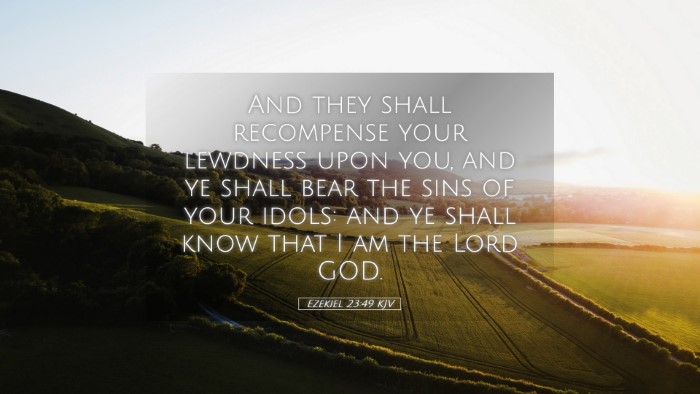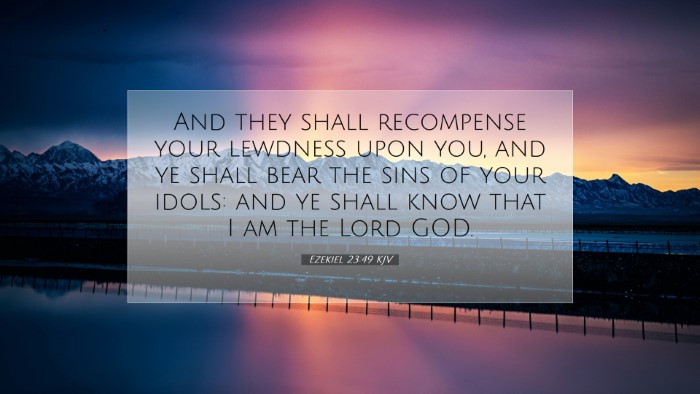Ezekiel 23:49 Commentary
Ezekiel 23:49: "And they shall recompense your lewdness upon you, and ye shall bear the sins of your idols: and ye shall know that I am the Lord God."
This verse serves as a culmination of the prophetic narrative illustrated in the preceding chapters of Ezekiel, where the prophet conveys God’s judgment upon two sisters representing Jerusalem and Samaria, personified as Aholah and Aholibah. The focus here is on God's severe response to the idolatrous practices and moral corruptions that characterized Israel and Judah.
General Insights
The themes outlined in Ezekiel 23:49 are densely packed with moral, theological, and historical significance. It encapsulates God's promise of retribution against those who engage in unfaithfulness, highlighting the inevitable consequences of sin and the nature of divine justice.
Historical Context
This chapter is rooted in the historical backdrop of Israel's covenant relationship with God, where idolatry is seen not merely as a violation of command but as an act of spiritual adultery.
Exegetical Analysis
- Recompense: The term "recompense" conveys the idea of receiving back, implying a reciprocal action from God. This concept is recurrent in Scripture, presenting a God who is just and holds His people accountable for their actions.
- Lewdness: This term primarily represents the idolatrous and immoral behaviors that distanced Israel from Yahweh. The essence of their sin was not just disobedience but intimate betrayal.
- Idols: The verse associates their sins directly with their idols, emphasizing the personal responsibility of the people for their choices. Idolatry is framed not only as a corporate sin but as individual betrayal against God.
Theological Reflections
Ezekiel 23:49 deeply engages with the nature of God’s holiness and justice. It reveals the repercussions of Israel's decision to forsake their covenant. The reminder that they "shall know that I am the Lord God" serves as both a confrontation and a hope. Even in judgment, God desires that His people recognize His sovereignty and righteousness.
The Nature of Divine Justice
Matthew Henry notes that this passage reflects the principle of divine retribution, calling believers to understand that repentance alone can restore their relationship with God. The verse acts as a painful reminder of the cost of their wretched decisions.
Application for Contemporary Believers
The implications of Ezekiel’s words urge modern-day readers to appreciate the seriousness of spiritual fidelity to God. Albert Barnes emphasizes that despite the severe judgment, God's underlying message is one of grace and the opportunity for genuine repentance.
Pastoral Insights
For pastors and church leaders, this passage is a call to maintain the integrity of worship and to be vigilant against the subtle encroachments of contemporary idolatry, which may manifest in various forms such as materialism or cultural conformity.
Leading with Understanding
Understanding this text requires recognizing that God still holds His people to account today. The moral complexity of worship requires leaders to teach the balance of grace and responsibility, acknowledging the pervasive tendency toward spiritual unfaithfulness in any age.
Encouragement for the Faithful
For those who strive to maintain their allegiance to God amidst adversity, Clarke’s commentary offers assurance. Despite impending judgment, grace remains available for those who sincerely turn back to God.
Conclusion
The weight of Ezekiel 23:49 resonates throughout biblical literature, echoing themes of accountability and the necessity of turning back to the true source of life. For theologians and scholars alike, it beckons a deeper exploration into the nature of God’s justice, mercy, and the ongoing call to fidelity in the covenant relationship.
As we reflect on this scripture, let us carry forward the lessons of divine retribution and unyielding grace, ever mindful of our call to live in obedience to the God who longs for our hearts.


